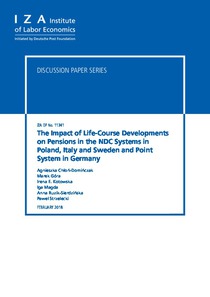The impact of life-course developments on pensions in the NDC systems in Poland, Italy and Sweden and point system in Germany
"Old-age pensions in the NDC systems reflect the accumulated lifetime labour income. Interrupted careers and differences in the employment rates, particularly between men and women will have a significant impact on pension incomes in NDC countries. In the paper, we compare the labour market dev...
| Main Authors: | , , , , , |
|---|---|
| Institution: | ETUI-European Trade Union Institute |
| Format: | TEXT |
| Language: | English |
| Published: |
Bonn
2018
IZA |
| Subjects: | |
| Online Access: | https://www.labourline.org/KENTIKA-19397452124911156349-The-impact-of-life-course-deve.htm |
| Summary: | "Old-age pensions in the NDC systems reflect the accumulated lifetime labour income. Interrupted careers and differences in the employment rates, particularly between men and women will have a significant impact on pension incomes in NDC countries. In the paper, we compare the labour market developments in four countries: Germany, Italy, Poland, and Sweden. There are pronounced differences in the labour market participation in the four countries: high levels of employment in Germany and Sweden are in contrast with low levels of employment in Italy and Poland. In the latter two countries, there is also a large gender gap in the labour market participation and employment pathways. Lower employment rates and gender pay gaps, as well as country-specific employment paths are important causes of differences in expected pension levels, but there are also differences due to the design of pension system and demographic developments. Prolonging working lives and reducing gender gaps in employment and pay, particularly for those at risk of interrupted careers, is key to ensure decent old-age pensions in the future. We argue that the pension systems' design modifications that weaken the link between contribution and benefits would not solve the challenge of providing adequate old-age pensions to people with interrupted careers. On the contrary, it would make the pension systems less sustainable, while the problem would be more challenging in the future." |
|---|---|
| Physical Description: | 39 p. Digital |

